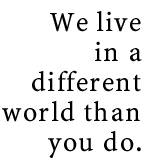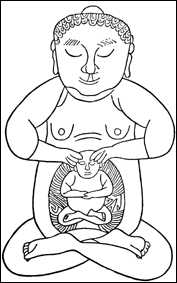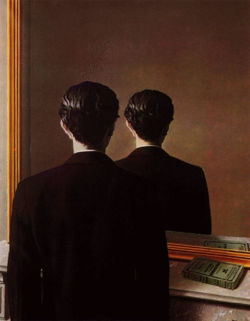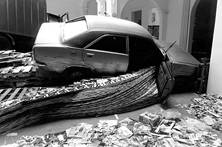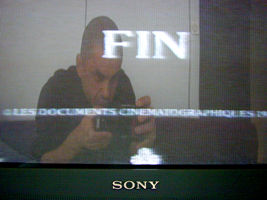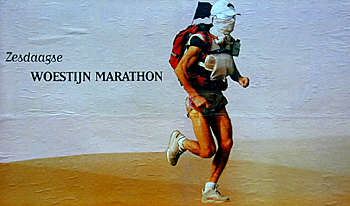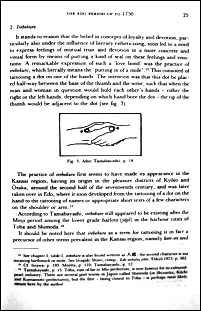|
|

|
||||||||||||||||||||||||||
|
|
Present Past Subjects Projects Misc |
OCTOBER 2000
Stopwatch
(left: Odilon Redon. right: Jenny Holzer.) Estrange, Alienate (person) in feeling (from another). How quickly can you estrange your employer? Your community? Your family? Your friends? How fast can you lose an audience? (We're taking proposals for events for a future 'Social Olympiade.') We've been listening to Autechre: Garbage. This wonderful 40 minute long EP dates from 1995, a time when Autechre was still considered 'comprehensible.' It is interesting to note how the recent Autechre releases seem to be developing faster than a goodly portion of Autechre's audience. (See, for example, the reviews of LP 5 and EP 7.) While on the topic of alienation does anyone have any idea how many people André Breton excommunicated from the Surrealist Movement during his lifetime? Thirty? Forty? Fifty? More? The best that we can come up with (at the moment) is a partial list. (It's incredible to see exactly who Breton was denouncing and throwing out of his club house all those years -- with enemies like these who needs friends?)
Separatism
God, Extreme Context
One Nation Under A Groove (Funkadelic, 1978.) While we've been thinkin' about...
and listenin' to...
a friend has pointed us towards... And impressed by the reviews we've added Ullica Segerstrale's 'Defenders of the Truth: The Battle for Science in the Sociobiology Debate and Beyond' to our reading list.
Glad That's Settled From More Songs About Buildings, an interview with Sean Booth of Autechre:
Easy Economics From 'Britain's favorite entrepreneur,' Stelios Haji-Ioannou, the creator of EasyJet.com, comes EasyEverything: The World's Largest Internet Cafés. We heard some time ago that EasyEverything had opened a Rotterdam cafe (350 PC's) but it was not until this afternoon that we had a chance to drop by and check it out. The short review: EasyEverything is precisely our kind of place. Not only do they serve large street-ready cappucinos (you know, the kind equipped with a lid with an extruded plastic 'nipple' that you can drink from while strolling -- a simple convenience until now quite unknown in the Netherlands) and offer computers with luscious LCD displays, they price their service according to a dynamic 'supply and demand' model, in other words, the busier it gets the more expensive it gets. The going rate for online time is displayed on a monitor at the entrance to the store and (currently) varies from Hfl. 2.50 (about $1 US) for 40 minutes online during peak hours to 240 minutes when everyone (else) has packed up and gone home. (When we visited the price was Hfl. 2.50 for 47 minutes.) The EasyEverything system of minute-to-minute internet cafe pricing reminds us of the congestion pricing model being implemented on some of California's 'private highways.'
Shopping Headphones: Our ears our happy. For months we've been searching for a good pair of headphones to mask the atrocious (heinously wicked) 'background muzak' at the gym. We've examined all makes and shapes of earbuds and headphones hoping to find something better than what we've been using -- poor stock Sony earbuds that can do no better than 'mix' the Schubert (or whatever other minidisc we're packing) with the boom-boom-boom beat of a set of felonious CD's named 'Aerobics 1, 2, and 3.' (We wonder how many other gym-going headphone-wearers suffer from this problem?) Until now the only product that we've come up with to do the job were Etymotic Research's ER-4P ear canal phones, undoubtedly totally audiophile and cool, but (to be honest) we were a bit put off by the $330 US price tag. Enter three small miracles: (1) The online discovery today of Koss's 'The Plug.' (2) The discovery of instructions on how to modify them so that they work even better than Koss intended. (3) And the discovery that they were available in Rotterdam. (Meaning instant gratification!) Cheese: Bought a big slice of our favorite seasonal cheese Vacherin Mont d'Or from our favorite cheese store. Mmm. Tea: Bought a box of Taylor's of Harrowgate Scottish Breakfast tea (to go with the cheese). Mmm-mmm.
God! Is there anything uglier than a frightened man! (Jean Anouilh) We had to deal with a frightened man today. At least we are of that opinion. That the man we had to deal with was frightened. How else to explain his conduct? The sad thing: we think the man was frightened not because of his own theories but because of his theories about the theories of others. (Epictetus: 'What upsets people is not things themselves, but their theories about things.') In other words: the man was worried about what others were going to think about the films the man had asked us to make. And those others who were thinking, whose thoughts the man seemed so worried about, were people the man did not know, nor, in our opinion, did the man understand them. This we thought was sad. Now we wonder about those others who we do not know (but who we are not frightened of), those others which the man, the man who we think was frightened, called 'the scientists.' We wonder about them. What would they have made of the films which they now will never see? Elsewhere And elsewhere love wins hands down every time. Jouke Kleerebezem's 'Parenting Ahead.' Fantastic stormy weather. Curiouser and Curiouser Variable sound transmission in colloids, or what some 'scientists' think about when some 'scientists' stir their tea. Listening to Autechre: Tri Repetae. Mike Tyler writes to share his discovery of an extraordinary artist-biologist surrealist-filmmaker and send us a link to a book about his life and work, Science is Fiction: The Films of Jean Painlevé. (Hmm... tell that to last Tuesday's frightened man.) Checking the library's online catalogue we're delighted to find that they have a copy of Academy Video's compilation of 9 of Painlevé's best known films, Surrealism and Science: The Weird World of Jean Painlevé. "Truth becomes fiction when the fiction is true;
(The Dream of the Red Chamber. Cao Xueqin.) Still listening to Autechre: Tri Repetae. Friday the 13th seemed as good a day as any to move around a lot of paper. The paper ended up going from one pile to another, but its dynamism helped us think of the work of the Scottish sculptor David Mach. Nice to remember Mach. We hadn't given him a thought in years... Looks like he's got a rather extensive web site now. (Check out his amazing installations with tons of newspapers and magazines.) Don't Fuck With Me Sculpture Mach's first public work was a full size Polaris submarine modelled out of 6,000 tires and placed outside the Hayward Gallery in 1983. It lasted a week before it was torched by an arsonist who, as Mach put it, "died later from terrible burns." We wonder: what was the target of this act of agression -- was it an attack against an 'art work,' a 'nuclear submarine,' or simply a big pile of tires? We've often dreamt of a public art work which could fight back against vandals, against vandalism. Imagine a space beyond interactive art. Consider the realm of retaliatory art. Populated with deathly cool Don't-Fuck-With-Me sculpture.
David Mach: Adding Fuel to the Fire (detail). Went to opening of Eulàlia Valldosera (works: 1990-2000) at Witte de With. We like her work very much. Very Spanish (legacy of Miró and Tàpies). Very simple and down to earth use of objects: slide projectors and video beams, mirrors, household furniture (life sized and minature) cleaning products, beauty and health care products, cigarettes. Very evocative use of moving shadows (gently pulsing, rhythmic) and reflected images. Two installations that stood out (text from the info sheet): Love's Sweeter than Wine - Three Stages in a Relationship. 1993-1994.
Les Demoiselles de Valence. 1999.
"In one window
(W. S. Merwin)
Sunday morning 9 A.M. (We photograph Artaud.) Dagmar_Chili
Via Geegaw. (Thanks!) Het Gaat Mis
Paul Heyne (author of The Economic Way of Thinking), Moral Misunderstanding and the Justification of Markets: "A major source of misunderstanding and moral confusion might be removed if economists simply stopped saying that economic theory describes a society running on greed and selfishness. I would prefer that we even stop saying that it presupposes the pursuit of self-interest, because this still lends itself to misunderstanding. Economic theory assumes only that people pursue the projects that interest them." Umberto Eco, From Marco Polo to Leibniz: Stories of Intercultural Misunderstanding: "The phenomenon I am interested in is more difficult to label, and let me to use for the moment being a tentative definition. We (in the sense of human beings), travel and explore the world bringing with us some "background books." It is not indispensable that we bring them with us physically; I mean that we travel having a previous notion of the world, received by our cultural tradition. In a very curious sense we travel by already knowing what we are on the verge of discovering, because some previous books told us what we were supposed to discover. The influence of these "background books" is such that, irrespectively of what the traveler discovers and sees, everything will be interpreted and explained in terms of them." "Sir Pitt Crawley was a philosopher with a taste for what is called low life." (From William Makepeace Thackeray, Vanity Fair, Chapter 9.) We spent the day in Breda with the film makers. Today's challenge was to come up with ideas and images to reflect the decisions to be made concerning the future role of science in this country. Should Holland invest in fundamental research or knowledge management (trading)? Should it encourage its artists, scientists and children to think outside of the box, to ask a lot of 'why and how' questions (difficult)? Or encourage them to develop trade and management infrastructures and ask a lot of 'where, when and who' questions (easier)? Heartless Life is a bitch. Life is a bitch made of trillions of little We know this and you know this, but each time we see it formulated -- we hear a tiny voice whining, "It is NOT fair! Say it isn't true!" Tonight that tiny voice was triggered by this passage in Robert Wright's The Moral Animal: "Understanding the often unconscious nature of genetic control is the first step toward understanding that -- in many realms, not just sex -- we're all puppets, and our best hope for even partial liberation is to try and decipher the logic of the puppeteer. The full scope of the logic will take some time to explain, but I don't think I'm spoiling the end of the movie by noting here that the puppeteer seems to have exactly zero regard for the happiness of the puppets." (We are driven by programs. Programs drive us. If we accept this -- but find this unacceptable -- what can we do about it? Well, two possibilities for overriding the code base immediately spring to mind: either (1) we can attempt to "send love into every experience, even the challenges" as we overheard Heather of Texting say the other day, or (2) we can attempt self sabotage, you know as in Holzer's adage: "Ruin your fucking self before they do.") (Friends, here's to the hope that at least this choice is ours...) Het Gaat Mis - Deel II
misalter, To alter wrongly; esp., to alter for the worse.
Couleur Locale Grooving to the amazing Speedy J. -- Public Energy Nr. 1 and A Shocking Hobby. Drinks and talk with Renee Turner (USA), Cesare Davolio (ITA), Thomas Buxó (FRA), Julika Rudelius (GER) at Cafe Rotterdam. Couleur Locale
Future Porn: Billboards soliciting new students for the Rotterdam Business School (Hogeschool voor Economische Studies). Dreaming... Body - Mind - Emotion - Reason
Of interest (to us) is this passage from Humphrey's text in which he cites the work of the Scottish philosopher Thomas Reid (1710-1796), in distinguishing between (subjective) sensing and (objective) perception: "Thus, I feel a pain; I see a tree: the first denoteth a sensation, the last a perception. The grammatical analysis of both expressions is the same: for both consist of an active verb and an object. But, if we attend to the things signified by these expressions, we shall find that, in the first, the distinction between the act and the object is not real but grammatical; in the second, the distinction is not only grammatical but real." "The form of the expression, I feel pain, might seem to imply that the feeling is something distinct from the pain felt; yet in reality, there is no distinction. As thinking a thought is an expression which could signify no more than thinking, so feeling a pain signifies no more than being pained. What we have said of pain is applicable to every other mere sensation." (Reid, 1764, p. 112.) Humphrey continues: "This is an extraordinarily sophisticated insight. And all the more remarkable that Reid should have come to it two hundred years before Wittgenstein was tearing his hair about similar problems and not getting noticeably further forward. "Even so, I believe Reid himself got only part way to the truth here. For my own view (developed in detail in my book, A History of the Mind, 1992) is that the right expression is not so much "being pained" as "paining". That is to say, sensing is not a passive state at all, but rather a form of active engagement with the stimulus occurring at the body surface. "When, for example, I feel pain in my hand, or taste salt on my tongue, or equally when I have a red sensation at my eye, I am not being pained, or being stimulated saltily, or being stimulated redly. In each case I am in fact the active agent. I am not sitting there passively absorbing what comes in from the body surface, I am reflexly reaching out to the body surface with an evaluative response -- a response appropriate to the stimulus and the body part affected. "Furthermore, it is this efferent activity that I am aware of. So that what I actually experience as the feeling -- the sensation of what is happening to me -- is my reading of my own response to it. Hence the quality of the experience, the way it feels, instead of revealing the way something is being done to me, reveals the very way something is being done by me." Smirch and Smutch: two perfectly good english words. Weblog behaviors: (1) Linking, (2) Name-dropping, (3) Propagating information, (4) Re-contextualizing experience, (5) Opinion-ating, (6) Souvenir collecting, (7) Stroking, (8) Stroke soliciting, (9) Dialog-ing, (10) Brand building, (11) Displaying, (12) Prioritizing. (From Alamut, Saturday 23 October 1999.) As a reminder. To remind us. Virginia Woolf, addressing a group of her Bloomsbury friends, once said: "Am I alone in my egotism when I say that never does the pale light of dawn filter through the blinds of 52 Tavistock Square but I open my eyes and exclaim, "Good God! Here I am again!" -- not always with pleasure, often with pain; sometimes in a spasm of acute disgust -- but always, always, with interest." Demian Murphy, recently on Generosity: "As for a generosity curriculum: A friend of mine told me recently that when he was very young he told his grandmother that he was bored. She replied, 'Only a fool is bored!' -- could a whole curriculum be designed out of that simple concept?" Couleur locale: On the way home this afternoon, on tram number 20, we stood next to a girl wearing orange contact lens. They suited her. This book just got pushed to the top of our evolutionary psychology wish-to-read stack: Geoffrey F. Miller. The Mating Mind: How Sexual Choice Shaped the Evolution of Human Nature. After the Razor
Jeez, our Micro Classic Urban Assault Scooter (purchased last May) didn't come equipped with 'contact patches.' And those 'RadiKS Mark II Smartwheels' -- while undoubtedly the ultimate answer to this country's infrastructurally functional but tooth rattling, skater unfriendly, stoep tegels (sidewalk tiles) -- don't look like they'll be shipping any time soon. So what can we buy TODAY to feed our ever evolving scooter habit? Where can we best invest money to speed and smooth our ride -- keep ahead of the Jones's -- and have more fun? We set ourselves this as today's problem. And at the end of the day we found we had salivated most over these two babies: the Xootr Street and the new Micro Air Flex. And the runner up: the incredibly fast and light Speedstick. (Ah, here's where we should say something politically-proper like, 'Protect us from what we want,' or 'Protect us from what's being offered.' But damn it, we are not going to.) Educationally speaking, we did learn something today about the invention process... ... about Karl Ulrich, the professor behind the Xootr. (Fast Company: Professor Ulriches Excellent Adventure.) ... about Wim Ouboter, the Dutch/Swiss engineer who invented the Micro (aka the Razor) and K-2's kickboard. (Excellent biography in Dutch.) ... about Sieghart Straka, the German engineer who invented the three wheeled Ciro and then sold the axle licence to Wim Ouboter. (Wall Street Journal Startup Success Story.) Coitus Interruptus Re: Yesterday's scooter lust. Of course the interplay of consciousness and conscience in 'Protect us from what we want,' and 'Protect us from what's being offered,' is what the Bardo Thödol is about. "Be not attracted towards the dull blue light of the brute-world; be not weak. If thou art attracted, thou wilt fall into the brute-world, wherein stupidity predominates, and suffer the illimitable miseries of slavery, dumbness and stupidness; and it will be a very long time ere thou canst get out. Be not attracted towards it." W. Y. Evans-Wentz. The Tibetan Book of the Dead. Re: Today The main event being the trip we made with Arno to the garden center where we filled his very hot Saab with willow fencing, earth, planting tubs and plants for our garden. Afterwards we drank coffee and talked -- about the gym, the pros and cons of sustainable thinking, social programming, calvinism and an 'Uncle Enzo style' pizza delivery company in Utrecht (which successfully solicits students to deliver pizzas by offering them money AND free study tutoring) -- for hours. Embedded Ian le Cheminant sends us an email containing a public part and a private part. Since we like it we are publishing the public part. The private part we have responded to privately.
For the story of Coriolus: The Coriolus Versicolor Summary Page. For the story of the Leucochloridium fluke and its effect on snail behavior: Richard Dawkins, Universal Parasitism and the Co-Evolution of Extended Phenotypes. (God knows how many times we have already linked to this paper.) Food for the Moon "The forces that are in opposition to the evolution of large human masses are also opposite to the evolution of every man (....). Actually, the moon feeds itself with organic life, feeds itself with mankind (...) that means that mankind is food for the moon. If all men would become too intelligent, they would not like to be eaten by the moon." G. I. Gurdjieff. (See our 05.06.00 entry.) After a couple of hours in the garden. Hark! to what we are told is the 'Trout Mask Replica' of the 90's (though good parts of it actually remind us more of Patti Smith's Horses) -- Slint: Spiderland. And you know what? After two listens we find their first outing even better... Slint: Tweez. Meanwhile, we continue to adore: Autechre -- EP7. Dagmar Chili
Couleur Locale
'The Six Day Desert Marathon,' an ad for Michelin. Alamut: 07.08.99. The most extreme marathon that we know of: 3100 miles (nearly 5,000 km.) This means running the equivalent of 2 normal marathons a day for 50 consecutive days... Where the Point is Reached We doubt whether "If these things are not ours, then whose are they?" Whoosh. Whoosh. A tempest has tested this area of the world for the last 24 hrs. With some gusts of wind exceeding 120 km/hr. A friend was blown off her bike and nearly landed in the River Maas as she was trying to pedal herself home after a visit to our studio. This is no joke. She later writes: "btw: my life did not flash before my eyes, there was no filmic moment... only me scratching and crawling to grab a meagre tree... holding on for dear life... all I could think of was... shit this can't be all there is..." By way of reply we stated that -- at least in our opinion -- the film doesn't start "until you've been floating downstream for at least half an hour and the lights of Rotterdam are growing dim." This is no joke. We're very glad she's okay. Indelible Signs of Loyalty And Devotion Mark Madel called last night asking about the page reproduced below. He claims we photocopied it from one of our books and gave it to him last January. We can not remember ever giving it to him. He says he's lost the photocopy and asks for it again. We say sure, would tomorrow be okay? (Mark has just opened a retrospective of his work at the Xerox Parc Gallery in Palo Alto. The show will be up until December 15.)
Earlier attention to 'Bondage and Liberation'... (1) Buddhist Bondage (With Hidden Noise Exposed). 17 February 2000. (Scroll down to the bottom of the entry.) (2) 'Oh Bondage, Up Yours!' 16 August 2000. A Halloween Thought Are we turning into One Nation Under A Grave? A Halloween Lunch Toasted slices of four-grain bread (viergranen brood), unbuttered, spread with De Traay's mountain honey and warm roasted walnuts.
ALAMUT.COM is artist owned and operated.
|
|
||||||||||||||||||||||||


